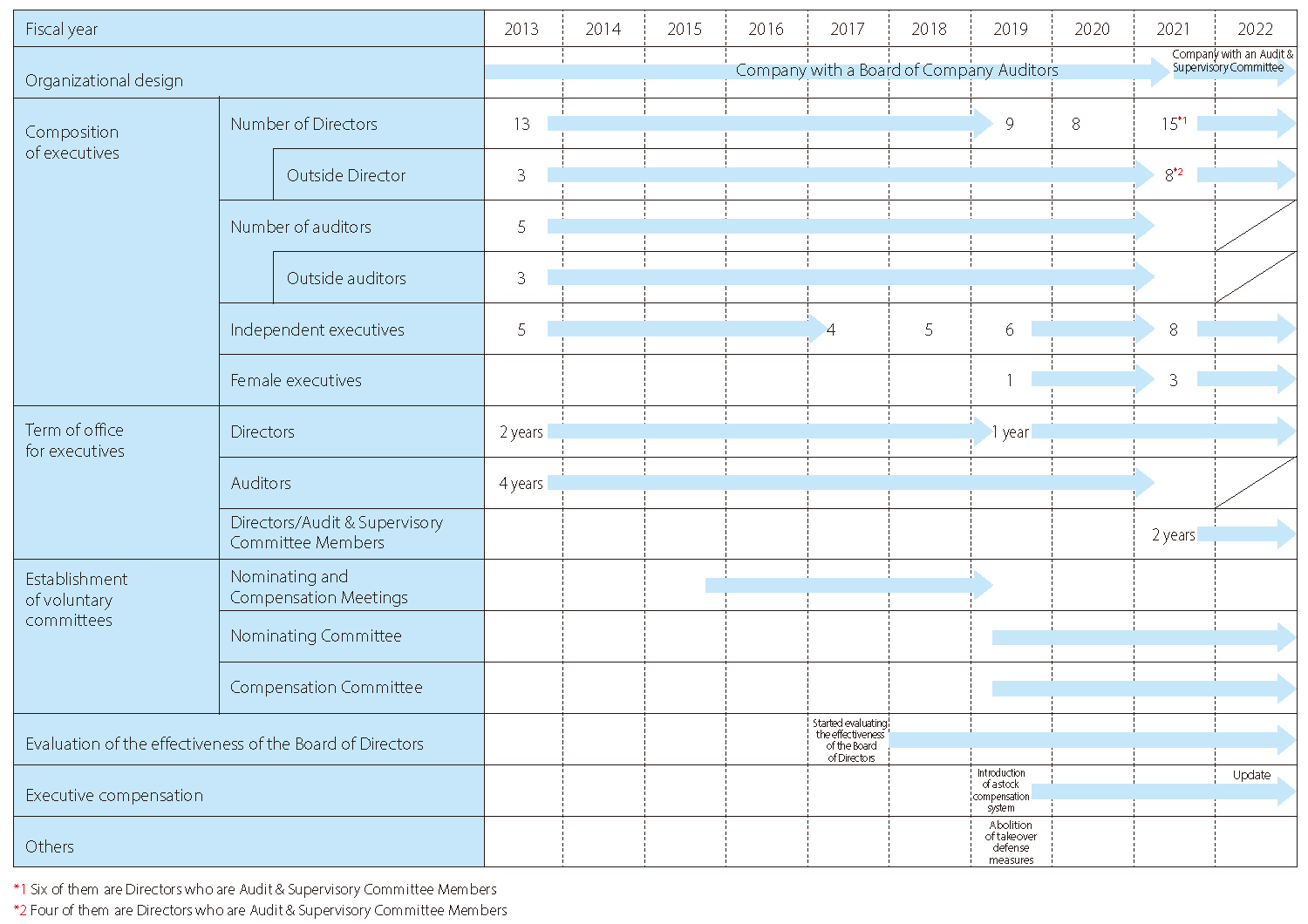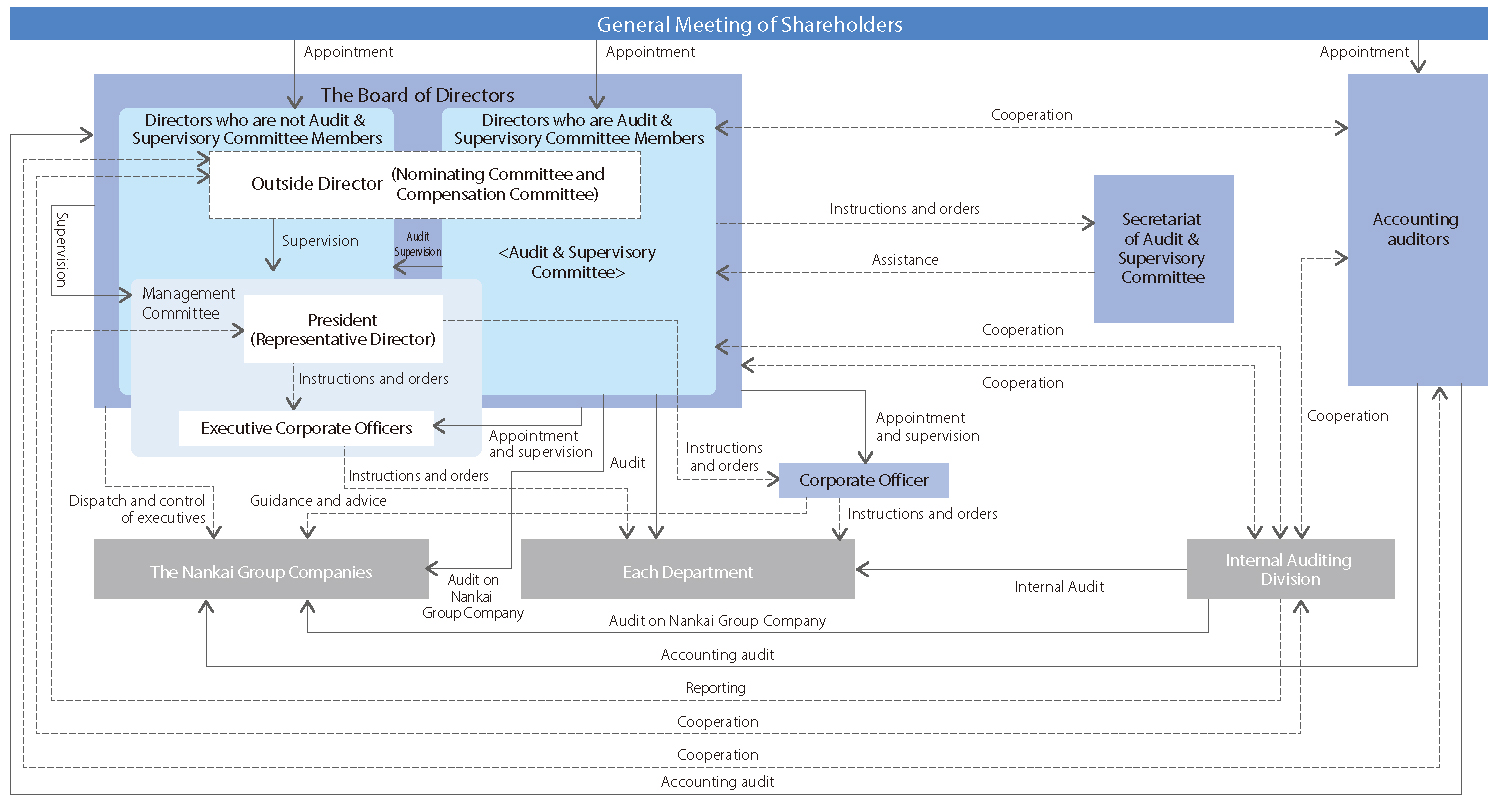Governance System
Basic concepts
Recognizing that strengthening corporate governance functions is an important management issue, we strive to ensure not only to comply with the law but also to have transparent management, make fair and rational decisions, and strengthen their supervisory functions.
We respect the principles of the Corporate Governance Code set forth by the Tokyo Stock Exchange and aim to achieve sustainable growth and increase corporate value over the medium to long term while constantly strengthening and reviewing our corporate governance functions.
Quick reference table for corporate governance system (as of June 23, 2022)
| Organizational design form | Company with an Audit & Supervisory Committee |
|---|---|
| Number of Directors | 15 |
| Of which, the number of Outside Directors | 8(53%) |
| Of which, the number of female Directors | 3(20%) |
| Of which, the number of Directors/Audit & Supervisory Committee Members | 6 |
| Of which, the number of Outside Directors and Audit & Supervisory Committee Members | 4 |
| Term of office for directors | 1 year (2 years for the term of office for Directors/Audit & Supervisory Committee Members) |
| Adoption of a Corporate Officer system | Yes |
| Board of Directors’ discretionary advisory committees | Nominating Committee and Compensation Committee |
| Director compensation system | Compensation for Directors (excluding Directors who are Audit and Supervisory Committee members) and Executive Corporate Officers* shall be classified into supervisory and executive compensation. |
| Breakdown of executive compensation system | (1)Supervisory compensation A fixed monthly amount paid in cash to Directors in accordance with their responsibilities. (2) Executive compensation Consists of basic compensation, bonuses, and stock-based compensation that are paid to Executive Corporate Officers. The ratio of compensation shall be 60% basic compensation, 25% bonus, and 15% stock-based compensation. a. Basic compensation
|
| Accounting auditors | KPMG AZSA LLC |
System
Outline of the corporate governance system and reasons for adopting this system
Being a company with an Audit & Supervisory Committee, we have increased both the number and ratio of Outside Directors with voting rights on the Board of Directors to strengthen the supervisory function of the Board of Directors and improve management transparency; and we delegate part of the Board of Directors’ decision-making authority over business execution to the Directors to improve the flexibility of the execution, thereby continuing with our aim to transition to a monitoring board. In addition, by positioning Corporate Officers as people who are responsible for business execution, the company makes a clear distinction between the business execution function and the supervisory function.
Given the nature of the company’s business and its social mission to ensure safe transportation, the Board of Directors appoints a reasonable number of directors from within the company who are well versed in the railway business and transportation safety management, while ensuring that the majority of them are Outside Directors. At the same time, by setting the Nominating Committee and Compensation Committee with a majority of their members being Outside Directors and the Audit and Supervisory Committee members, the management ensures fairness, objectivity, and transparency in the decision-making process on important management matters, including nomination and compensation.
In addition, the company strives to strengthen the supervision of the management by the Board of Directors and the Audit & Supervisory Committee by regularly reporting to the Board of Directors and the Audit & Supervisory Committee on the status of internal control system operations, including internal audit plans and results.
Transition to a stronger governance system

Outline of corporate governance and internal control systems (as of June 23, 2022)

Business execution
The Board of Directors
The Board of Directors (chaired by the President and Representative Director, with the General Affairs and Public Relations Department as the Secretariat) consists of 15 Directors including eight Outside Directors (Six of them are Directors who are Audit & Supervisory Committee Members) and meets once a month in principle to make decisions on basic management policies and the execution of the company’s business, and to supervise the Directors’ performance of their duties. In accordance with the provisions of the Articles of Incorporation and resolutions of the Board of Directors, the company delegates important business execution decisions to the Directors, thereby enhancing the agility of business execution.
Management Committee
The Management Committee (presided over by the President, with the General Affairs and Public Relations Department as the Secretariat) consists of Executive Corporate Officers and other Corporate Officers appointed by the President, and meets once a week as a deliberative body for the President to make decisions on important business execution based on the basic management policies set by the Board of Directors.
Nominating Committee
We will ensure the fairness, objectivity, and transparency of the nomination process by establishing a Nominating Committee (Head of the committee: Kiyoshi Sono, Outside Director; Committee members: Teruhiko Achikita, President and Representative Director; Hitoshi Tsunekage, Outside Director; Miharu Koezuka, Outside Director; and Takeshi Kunibe, Outside Director and Audit & Supervisory Committee Member)
The following matters are discussed by the Committee members prior to the Board of Directors meeting.
Decision on candidates for Directors, selection of a Representative Director, and appointment of Corporate Officers
Dismissal of Directors and Corporate Officers, and the propriety of dismissal or non-reappointment of Representative Directors
Specific operation of the succession plan for the chief executive officer based on the management responsibility determined by the Board of Directors and the selection policy
Compensation Committee
We will ensure the fairness, objectivity, and transparency in the compensation decision-making process by establishing a Compensation Committee (Head of the committee: Hitoshi Tsunekage, Outside Director; Committee members: Teruhiko Achikita, President and Representative Director; Kiyoshi Sono, Outside Director; Aiko Mochizuki, Outside Director; and Shohei Miki, Outside Director and Audit & Supervisory Committee Member)
Regarding the determination of compensation for individual Directors (excluding Directors who are Audit and Supervisory Committee Members) and compensation for Executive Corporate Officers, the President and Representative Director is entrusted with the responsibility of making the decisions through resolutions of the Board of Directors; however, the decisions must be approved by this Committee. In the event of any revision to the policy regarding the determination of the amount of compensation, etc., of executives or the method of calculation thereof, the details of such revisions shall be deliberated by the Committee prior to the resolution of the Board of Directors.
Status of audits by the Audit & Supervisory Committee
The Audit & Supervisory Committee consists of six members, including four Outside Directors. The committee selects members to investigate the status of operations and assets of the Company and its subsidiaries, and deliberates and makes resolutions at Audit & Supervisory Committee meetings to audit the execution of duties by Directors. In addition, full-time staff are assigned to assist the duties of the committee, and in order to ensure the independence of such full-time staff, their transfer, evaluation, and other relevant matters are discussed in advance with full-time Audit & Supervisory Committee members. The Audit & Supervisory Committee (Head of the Committee: Kozo Arao, Outside Director and Audit & Supervisory Committee Member; Secretariat: Secretariat of Audit & Supervisory Committee) consists of six members and generally meets once a month to audit the performance of duties.
With resolutions passed at the 104th Regular General Meeting of Shareholders held on June 25, 2021, the Board of Directors has been operating as a company with an Audit & Supervisory Committee. In FY2021, the Board of Company Auditors held three meetings and the Audit & Supervisory Committee held ten meetings. The attendance of individual Auditors and Audit & Supervisory Committee Members were as follows.
Attendance in FY2021
| Name | Attendance at Meetings | ||
|---|---|---|---|
| Audit & Supervisory Committee | Board of Company Auditors | ||
| Audit & Supervisory Committee Member(full-time) | Keiichi Iwai | 10/10 | 3/3 |
| Audit & Supervisory Committee Member(full-time) | Keiji Urai | 10/10 | 3/3 |
| Audit & Supervisory Committee Member(external) | Kozo Arao | 10/10 | 3/3 |
| Audit & Supervisory Committee Member(external) | Takeshi Kunibe | 10/10 | 3/3 |
| Audit & Supervisory Committee Member(external) | Shohei Miki | 9/10 | - |
| Audit & Supervisory Committee Member(external) | Tomoko Igoshi | 10/10 | - |
*1 Senior Corporate Auditor from April 1 to June 25, 2021
*2 (External) Auditor from April 1 to June 25, 2021
The main items discussed at the Audit & Supervisory Committee meetings include audit reports, basic audit matters, progress in management planning, the Management Committee proposals and reports, the status of audits by the accounting auditor, the accounting auditor’s evaluation, the status of internal audits, etc., and the status of implementation of countermeasures for major risks.
Outside Director
Outside Directors are encouraged to use their insight, experience, and expertise as corporate executives, certified public accountants, consultants, and legal prosecutors and lawyers for the management of the company. They are expected to provide precise advice on the overall management of the Group and enhance the effectiveness of auditing and supervision from an independent standpoint without any relationship with the Company’s management that could exert significant control over each other.
When appointing Outside Directors, we assume that they have no material interests in the Company and that they are not subject to the independence criteria set forth by the Tokyo Stock Exchange when they are registered as independent officers. Based on these assumptions, the requirements for Outside Directors include having the insight and experience necessary to supervise or audit the execution of the diverse range of duties in our Group business, including our railway business in which the assurance of safe transportation is our social mission, and having the willingness and ability to work proactively to fulfill the roles expected of them from an independent position in order to meet the mandate entrusted by the shareholders.
Based on this, the company has appointed Outside Directors who are independent, and we believe that the appointments are sufficiently functional to maintain and improve our corporate governance system.
Support system
In order to ensure effective supervision or auditing by Outside Directors or Outside Directors and Audit & Supervisory Committee Members, the General Affairs and Public Relations Department Chief Manager, who serves as the secretariat of the Board of Directors, distributes materials of the Board of Directors meetings to Outside Directors in advance to the extent possible, and, if necessary, provides opportunities for officers in charge, etc., to explain the proposals and their contents in advance. Through these efforts, we strive to ensure the appropriateness of decision-making procedures at the Board of Directors. In addition, materials on the deliberations and matters to be reported, as well as a notice of deliberations, are sent to the Outside Directors who are absent from the Board of Directors meetings.
The Secretariat of Audit & Supervisory Committee is in charge of the secretariat of the Audit & Supervisory Committee, which communicates the date and time of the Audit & Supervisory Committee meetings, provides advance notice of the agenda, and assists with on-site audits at each business location as necessary. Additionally, full-time Audit & Supervisory Board members provide explanations and reports to Outside Directors and Audit & Supervisory Committee Members from time to time on useful information for conducting audits, such as information discussed at the Management Committee meetings and information obtained from other documents approved by the Management Committee.
Executive training
The training necessary for Directors to fulfill their roles and responsibilities is provided as shown in the table below.
| All executives | We encourage executives to attend external training programs as appropriate, for which the company will pay the necessary expenses. |
|---|---|
| Internal and Newly appointed | We provide training by experts in law, corporate governance, and other areas. |
| Outside | We offer tours of our Group’s facilities and other events. |
| Outside and Newly appointed | We will explain our business, financial condition, and management strategies. |
